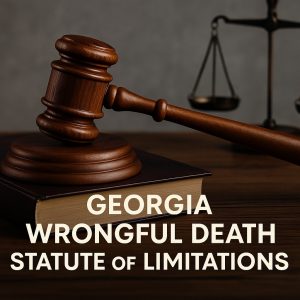 Losing a loved one due to someone else’s negligence or misconduct is devastating. In addition to emotional grief, families often face financial challenges from medical bills, funeral expenses, and the sudden loss of income. Georgia law provides a way for surviving family members to pursue justice through a wrongful death lawsuit.
Losing a loved one due to someone else’s negligence or misconduct is devastating. In addition to emotional grief, families often face financial challenges from medical bills, funeral expenses, and the sudden loss of income. Georgia law provides a way for surviving family members to pursue justice through a wrongful death lawsuit.
One of the most critical aspects of filing such a claim is understanding the Georgia wrongful death statute of limitations; the legal time frame in which a claim must be filed. Missing this deadline can result in losing the right to compensation entirely.
What Is a Wrongful Death in Georgia?
According to Georgia law, a wrongful death occurs when someone’s life is taken due to the negligent, reckless, intentional, or criminal actions of another person or entity. This can include car accidents, medical malpractice, defective products, or even intentional crimes. Under Georgia Code Title 51, Chapter 4, wrongful death statutes outline who may bring a lawsuit and what damages may be recovered.
The law defines wrongful death as any instance in which a human being dies due to the legal fault of another, whether through negligence, misconduct, or defective property. For families, a wrongful death claim is not only about financial recovery, but also about holding wrongdoers accountable.
Who Can File a Wrongful Death Lawsuit in Georgia?
Not every family member is permitted to file a wrongful death lawsuit in Georgia. The law establishes a strict order of eligibility, as outlined in Nolo’s overview of Georgia wrongful death laws:
- The surviving spouse has the first right to file.
- If there is no surviving spouse, the deceased’s children may file.
- If no spouse or children survive, the parents of the deceased may bring the claim.
- If none of the above relatives are alive, the executor or personal representative of the estate may file on behalf of the next of kin.
This structured approach ensures that only legally recognized family members pursue compensation, preventing disputes between extended relatives.
What Damages Are Recoverable?
In Georgia, wrongful death claims allow families to recover damages under two main categories:
1. The “Full Value of the Life” of the Deceased
This includes both economic and intangible contributions the deceased would have provided, such as lost wages, financial benefits, companionship, guidance, and care.
2. Financial Losses to the Estate
The estate may recover medical expenses related to the final injury or illness, funeral and burial costs, and other necessary expenses. These damages are pursued separately through the estate’s representative.
Georgia’s Wrongful Death Statute of Limitations
The statute of limitations is one of the most important legal rules in a wrongful death case. In Georgia, wrongful death claims generally must be filed within two years of the date of death (Ga. Code § 9-3-33). Failing to file within this period typically bars the family from pursuing compensation, regardless of the strength of the case.
Exceptions That May Extend the Deadline
- Criminal Cases: If the death resulted from a crime, the statute of limitations is paused until the criminal case concludes, for up to six years. Once the criminal matter ends, the two-year civil statute begins to run.
- Unprobated Estates: If the deceased person’s estate has not been probated, the statute of limitations may be paused for up to five years.
It is important to note that Georgia courts do not apply the “discovery rule” to wrongful death cases. This means the two-year period begins at the time of death, not when the family discovers potential negligence (Justia: Georgia Code).
Why the Statute of Limitations Matters
Understanding and complying with the statute of limitations is vital. Evidence can be lost, witnesses may become unavailable, and defendants can argue that the family no longer has a legal right to bring the case. Consulting with an attorney as soon as possible ensures deadlines are met and claims are properly preserved.
How a Georgia Wrongful Death Attorney Can Help
Wrongful death lawsuits are complex, often requiring extensive investigation, expert testimony, and skilled litigation. Families already coping with grief should not have to navigate these legal hurdles alone. At Davies Hothem Injury Law in Gainesville, our attorneys have decades of experience guiding families through the legal process with compassion and dedication. We work to prove liability, handle legal complexities, and maximize compensation for our clients.
Our attorneys have handled cases involving car accidents, medical malpractice, truck accidents, and other tragedies. We intentionally maintain a smaller caseload so every client receives personal attention and thorough preparation. From gathering accident reports and medical records to negotiating with insurance companies and litigating in court, our team ensures families have the strongest possible case.
Take Action Before Time Runs Out
If your family has lost a loved one due to another’s negligence, it is critical to act quickly. Georgia law places firm limits on how long you have to seek justice and financial recovery. Do not wait until the deadline approaches. An experienced wrongful death lawyer can evaluate your case, explain your options, and ensure your rights are protected.
About Davies Hothem Injury Law
Kristy Davies, Jennifer Hothem, and Dustin Davies formed Davies Hothem Injury Law with a mission to restore hope and healing to their clients while supporting women, children, and veterans in the community. With more than 100 trials and over $150 million in verdicts and settlements, they bring extensive litigation experience and compassionate advocacy to every case. Their commitment goes beyond the courtroom, as they actively support community initiatives and domestic violence survivors in Georgia.
